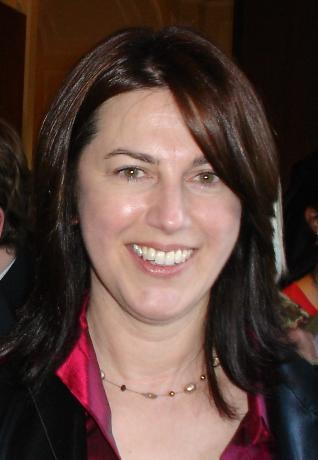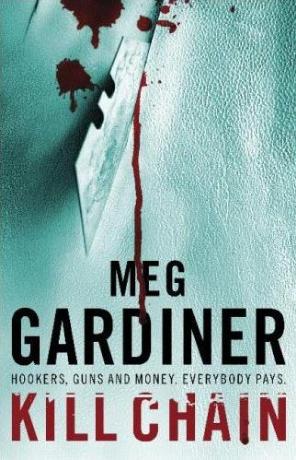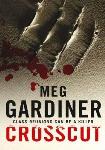



|
|

|

|





|
Thriller writer, Meg Gardiner was brought up in Santa Barbara in the US but currently resides in the leafy suburbs of Surrey in England with her husband and children. After graduating from Stanford Law School and practised law in L.A. she went on to teach in the Writing Program at the University of California. Before turning her hand to thrillers, she was a travel writer. Her debut novel called China Lake introduced her character, Evan Delaney to the public. Since then, Meg has followed up Mission Canyon, Jericho Point and Crosscut with her latest thriller, Kill Chain which continues the misadventures of her terrific heroine. Evan's father disappears, the cops think he's fled the country to avoid prosecution. But Evan believes it is to do with his work for Naval Intelligence and begins hunting for him . I thought it would be neat to try and find out what makes Meg tick. Mike Stotter YOU ARE AT A PARTY, SOMEONE ASKS WHAT YOU DO. YOU TELL THEM YOU ARE A WRITER BUT HOW WOULD YOU INTRODUCE EVAN DELANEY? Evan's a freelance journalist from California. She's spirited, quick-witted, and fights hard for the people she loves. Okay, she's too brash for her own good, which is why she's on her second set of teeth. But she's a softy at heart. She thinks the world is tragic and so you'd better laugh whenever you can. Pour her a glass of Jack Daniel's and ask her about finding that FBI agent hogtied to her bed, stripped and ranting. Just don't get on her bad side, because she may have a heatseeking missile stashed in her car. Why are you looking at me like that? WHAT DO YOU CONSIDER THE MOST DIFFICULT ASPECT OF WRITING? The first draft. Sketching ideas - 'Somebody is killing Evan's high school class' - is simple. Turning those ideas into compelling scenes is like pulling my own teeth with pliers: slow, painful and messy. HOW DO YOU KNOW WHEN A STORY IS RIGHT? DOES IT HIT YOU FIRST TIME OR ARE YOU CRITICAL OF IT AS YOU GO ALONG? It's right when readers say "Oh my God" at a plot turn they never saw coming. It's right when they laugh out loud on airplanes, can't sleep until they finish the book, and phone at three a.m. to yell at me for killing a favorite character. But those things don't happen till I've jettisoned half my original ideas, mud-wrestled others into submission, and flayed several drafts of the story to shreds. PART OF THE THRILL OF BEING TOLD A STORY IS THE CHANCE OF BEING HOODWINKED OR CONNED - CAN YOU GIVE AN EXAMPLE OF THIS FROM EITHER YOUR NOVELS OR RESEARCH? How about real life identity theft? A few years ago a ring of thieves hijacked my credit card from the mail, forged an American passport in my name, and stole loads of cash in the Philippines by drawing on my bank and my reputation. Oh joy. But I used the episode as the seed for the stolen identity scam in Jericho Point. And back when I was a lawyer, a convict conned his way onto the phone with me by claiming he was seeking legal counsel to appeal his conviction. But he didn't want an attorney. He had seen me on the television quiz show Jeopardy! and wanted to talk about the money I had won. And about my little girl. And his upcoming release from prison. And could he marry me. For real. Ever see a woman rip a phone from the wall? Turns out that this guy was serving a fifteen-year sentence for armed robbery. He had held up a US mail truck, at gunpoint. Stark naked. The warden is supposed to notify me when he's released. When I work that one into a book, I'll let you know. GIVEN THAT TODAY'S READERS ARE AN INTELLIGENT LOT, DO YOU FEEL OBLIGED TO HAVE A MORE SIGNIFICENT PURPOSE IN YOUR WRITING THAN MERELY TELLING STORIES? I try to explore the boundary between morality and wrongdoing. When is it justified to go outside the law to right a wrong? When can you use ruthless violence to defend somebody you love? Possibly I came to reflect on this issue after an armed robber asked questions about my little girl. HOW DO YOU COME TO WRITE A STORY? DO YOU OBSERVE ALL THE TIME, LIKE A REPORTER? I observe, take notes and shamelessly appropriate things my friends and family say and do. I'm also a news junkie. The problem with that is that all headlines start to look like story material. I see 'Volcanic Vent Plunge' and think, wild. Gotta be a great story. Until I read that a California ski patrol died falling into that volcanic vent. Then I know it's time to back off and read as a human being. IS THERE A SUBJECT MATTER YOU'D CONSIDER AS TABOO? No. No subject should be off-limits. That road leads to timidity and repression. However, I think certain approaches to subjects are repulsive. Gratuitous, protracted, explicit violence is sometimes offered as a feast, and portrayed with such lurid and eager detail that it becomes almost pornographic. But we should argue about such approaches, not forbid them. WHY DO YOU THINK THAT CRIME IS THE MOST POPULAR GENRE? Because it grabs readers, takes them on a menacing ride to places they'd hate to go in real life and returns them safely, feeling thrilled. And especially because crime writing is about morality: finding justice, restoring order out of chaos. DO YOU BELIEVE THAT YOUR CHARACTERS TAKE ON IDENTITIES OF THEIR OWN? They do, and I can't stop it. That's because I'm the god of my characters' world, but readers have free will. They take the people I've created and bring them to life within their own imaginations. So one reader can think that Jesse Blackburn's combative sarcasm is bound to get him killed, while others find him warm and funny, and ask me for his phone number. I WONDER IF YOU HAVE A FAVOURITE CHARACTER FROM YOUR BOOKS, ONE WHO'S NOT THE PROTAGONIST OR SIDEKICK? Two: Jax Rivera - spook, freelance killer, style diva. Both Reaper and guardian angel, she keeps you guessing whose side she's on. PJ Blackburn - a scam artist, feckless and scheming, but prone to fits of decency. He's endearing, he's trouble, and he's family, so there's no getting around him. DO YOU KEEP AN IDEAL READER IN MIND WHEN YOU WRITE? Someone who's smart, who has a sense of humor and an appetite for thrills. Somebody with high expectations of my characters and story, which I'd better meet. DO YOU THINK SOME REVIEWERS AND READERS HAVE MISTAKEN YOU FOR YOUR CHARACTERS? Definitely. Which amuses me, because I've never defended myself with either a flare gun or a ferret. Just with a samurai sword. And when I finished chasing that squirrel out of my house, it knew who was boss. I don't mind the confusion, but it rankles my husband to be mistaken for Evan's boyfriend Jesse. Readers smirk and say, 'Oh, man, we know what you get up to.' Folks: it's fiction. My husband has never gone after a religious nutcase with a gun, or had a knockdown fight at a wedding. And he can walk. Though he can't surf. And it was his sword. HAVE YOU EVER BEEN PERSONALLY AFFECTED BY SOMETHING YOU'VE WRITTEN? By every cheque I've made out to the Inland Revenue. The pain still lingers. AS ANY SERIES CONTINUES THE RANGE OF OPTIONS FOR THE MAIN CHARACTER WILL NARROW DOWN, DO YOU FIND YOURSELF CONSCIOUSLY THINKING HOW WILL EVAN DEVELOP? Absolutely. I have to mull where the character is going, in terms of both her emotional path and "what's next?" Because violence inheres in crime stories, a character who stays unchanged in the face of trauma and grief is either a cartoon or a zombie. The challenge is to have a character grow wiser but not hard-hearted, world-weary but not cynical. Especially a character like Evan, who relies on moxy and her sense of humor to get her through. It's a matter of resilience and equilibrium: the character needs to stretch but retain the core that readers recognize. That said, sometimes I have to let the pendulum swing. But don't worry, Evan won't be joining either a convent or the Special Forces. WHAT ARE YOU WORKING ON AT THE MOMENT? I'm researching my next novel. I've just returned from San Francisco, where I found earthquake faults and plenty of heights from which characters can plunge to their deaths. Great food, too. IN CLOSING, COULD YOU SUMMARISE WHAT REALLY MOTIVATES YOU AS A WRITER? Hearing a reader say, 'I couldn't put it down.' To capture and hold people with stories spun from my own imagination - how great a job is that? Nothing beats it. |

| Webmaster: Tony 'Grog' Roberts [Contact] |